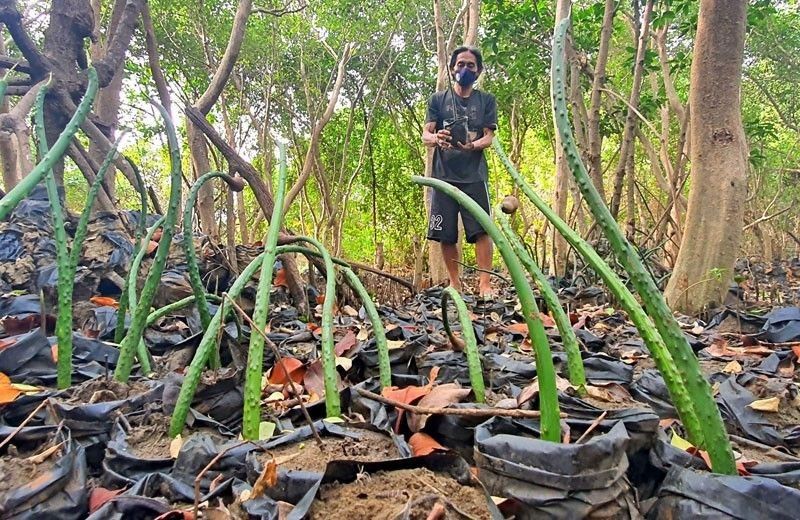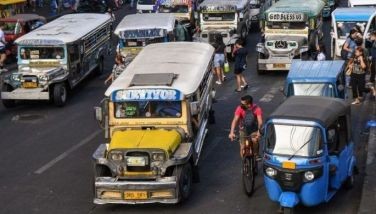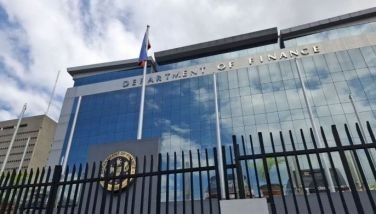Pinoys urged to join fight vs climate change

MANILA, Philippines — President Marcos has called on Filipinos to unite in the fight against the negative effects of climate change as the world celebrated Earth Day yesterday.
“This Earth Day, we urge the public and our fellow public servants to join the global action against climate change,” Marcos said in a post on Twitter.
Each year on April 22, people around the world celebrate Earth Day to demonstrate support for environmental protection.
Citing the Philippines as one of the most vulnerable countries to climate change with an average of 20 typhoons visiting it annually, Marcos stressed: “Our administration remains fully supportive of environmental programs and policies.”
To learn more about the government’s initiatives to combat climate change, the Chief Executive urged the public to visit the social media sites of the Climate Change Commission (CCC), the lead policy-making body which he chairs.
Marcos said the CCC ensures the mainstreaming of climate change in national, local and sectoral development plans towards a climate-resilient and climate-smart Philippines.
Speaking at the Asia-Pacific Economic Cooperation CEO Summit in Bangkok, Thailand in November last year, Marcos highlighted that climate change is “the most pressing existential challenge of our time” that indelibly impacts the global economy.
He underscored how Philippines is at great risk from the climate crisis, as it stands to lose more than six percent of gross domestic product GDP annually by 2100, citing a study by the Asian Development Bank.
Despite global agreements seeking multilateral solutions, such as the United Nations Framework Convention on Climate Change and the Paris Agreement, the President noted that “not enough” progress has been made as greenhouse gas emissions continue to rise.
The Marcos administration is pushing for renewable energy options such as hydropower, geothermal power, solar and other low-emission energy sources.
It set a target for a higher share of renewable energy in the power generation mix of 35 percent by 2030 and 50 percent by 2040.
‘Sachet capital’
One thing for Filipinos to ponder on is how the Philippines has been tagged as the “sachet capital of the world” for being the top contributor to ocean plastic pollution.
In a radio interview, CCC Commissioner Albert dela Cruz underscored the need to eliminate the use of single use plastic in the country.
“During his (Marcos’) SONA (State of the Nation Address), he said that the Philippines is the top three contributor to ocean plastic pollution. This was last year; but in January this year, an international magazine said that the Philippines is now the No. 1 ocean plastic contributor,” Dela Cruz said.
Environment Secretary Maria Antonia Yulo-Loyzaga has said the country generates at least 2.7 million metric tons of plastic wastes and that 20 percent of these end up in the oceans.
Despite various efforts to ban single use plastics in industries, the country produces 7,000 metric tons of plastic waste daily, she said.
Dela Cruz said authorities have failed to implement Republic Act 9003, the Solid Waste Management Act.
Posing his question to the nation, he said: “When we go to the beach, we bring a sachet of shampoo, a sachet of toothpaste, a sachet of soap, we also have food from the fast food chain. While we enjoy these blessings, do we give back to our Mother Earth in disposing our garbage?”
Whether the Philippines is No. 1 or No. 3 among the top plastic polluters of oceans is no longer the issue, said Dela Cruz, but the fact that plastic wastes end up in these great bodies of water and get eaten by fish is what is of concern.
“These plastics will be eaten by fish and cause lead content in the food we eat,” he said.
The CCC official cited a World Bank (WB) study stating that by 2050, there will be more plastics than fish in the oceans. “By that time, fish in the ocean will no longer be safe for human consumption,” he said.
Dela Cruz explained how plastics produce micro plastics that invade the food chain.
“That is the reason we have carcinogenic chemical compounds and, according to a study in the US, eight out of 10 of males with prostate problems and females with breast cancer were positive of Bisphenol A (BPA). It is a compound that causes prostate and mammary gland cancer and eight out of 10 children with attention deficiency syndrome also have traces of Bisphenol,” he said.
The CCC is enjoining all concerned government agencies to ensure the compliance of manufacturers with Republic Act 11898 (Extended Producer Responsibility Act of 2022) making firms responsible for plastic packaging.
RA 11898, which lapsed into law last July 30, amended RA 9003 (the Ecological Solid Waste Management Act of 2000), mandating companies to establish Extended Producer Responsibility (EPR) programs for plastic waste reduction, recovery and diversion.
Through EPR, enterprises are obliged to recover or offset their generated plastic product footprint by 20 percent in 2023 and 80 percent by 2028.
Among the plastic packaging covered by the EPR Law include single or multi-layered plastics such as sachets, rigid plastic packaging products like food and drink containers, single-use plastic bags and polystyrene.
Penalties for non-compliance of EPR duties range from P5 million to P20 million, or twice the cost of recovery and diversion of the footprint or its shortfall, whichever is higher.
Dela Cruz called on the nation to celebrate Earth Day, knowing full well that “we only have one planet” and there is “no Plan B” should we destroy it.
“By 2050, if we fail to implement carbon mitigation, the temperature will increase by more than 1.5 degrees Celsius. This will cause a big problem in the climate that we call climate abnormalities,” he said.
- Latest
- Trending
































